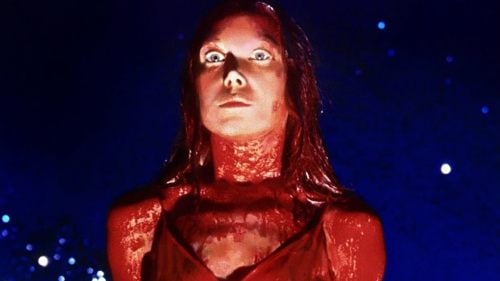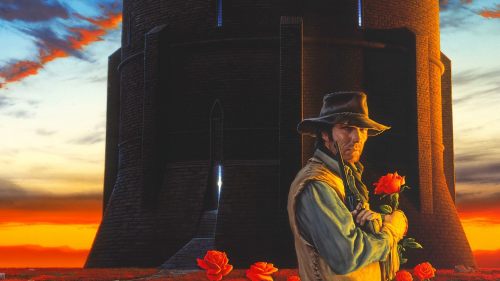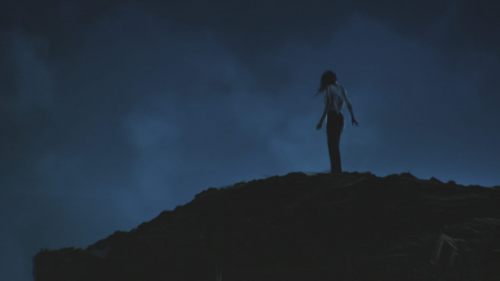Review: THE DARK TOWER Has Already Fallen
Let us begin by setting aside - or trying to set aside - the novels.
It's nearly impossible to do so, especially if you're a Dark Tower supernerd like me. Even if you walk in armed with the understanding that Nikolaj Arcel's film was designed to be a "remix/sequel" to the novels rather than a literal adaptation, even if you insist you will keep the most open mind possible...it's still incredibly difficult to set aside what we know versus what we have been given. It's just how nerdery works.
But even if we set aside this particular interpretation of the mythology, The Dark Tower is a deeply flawed movie. It's a film that feels rushed and plodding, sometimes within the same scene. It's a film that saddles two of our greatest working actors with clunky dialogue and muddled motivations. It's a film that feels claustrophobic and oddly contained when it should've felt sweeping and epic. After decades of waiting, after months of keeping our fingers crossed and hoping for the best, it brings me zero pleasure to report that The Dark Tower doesn't really work.
(If you really want to get down to brass tacks, we have to admit to ourselves that The Dark Tower probably never should've been a movie. This is a property screaming out to be turned into another ongoing HBO event series, a format that would have allowed its showrunners to tease out the series' many mysteries and wander down its various alleyways, building the world as it went. Obviously, that ship has long since sailed, but I think it worth mentioning that this entire enterprise was assembled atop a faulty foundation. But let's not dwell on woulda-could-shoulda!)
The biggest problem here isn't the remixing of the Dark Tower mythology or the casting or even the wonky special effects (though all of those elements are certainly there to share the blame). No, the biggest problem is how lifeless it all feels, how weak and lame the final product is. There's an odd flatness to the whole thing, and the film's central conflict - the Man In Black wanting to harness Jake's psychic abilities versus Roland's eventual interest in keeping The Boy safe - comes across like a gross oversimplification of the source material. Of course this thing needed to be palatable for general audiences, and of course making Jake the audience surrogate was the obvious way to introduce said audiences to the bizarre world Stephen King created...but surely it didn't have to feel this bland and static. So much of it just kind of sits there.
There are elements - moments, really - that work. A scene where Roland saves Jake from what appears to be a number of demons breaking through a thinny comes closest to matching the awe-inspiring weirdness dotted throughout the novels, but the scene immediately undercuts itself by having one of those demons (rendered in highly-questionable CGI) break through and chase Jake around a dilapidated amusement park (in execution, it feels like something out of a Paul WS Anderson joint). There's another fun scene where Roland finds himself being questioned by a doctor inside a NYC hospital, but they double down on that fish-outta-water angle in a later scene that's just skin-crawlingly corny (it involves Roland eating a hot dog). The movie is mostly like that, only it feels a lot more like "one step forward, four steps back" rather than a one-for-one give and take.
I was not surprised to discover that Idris Elba's the best thing in the movie (he struggles mightily to sell large chunks of the film's expository dialogue and...well, what can I say? Everyone's got their limitations), but I was surprised by how much I disliked Matthew McConaughey's take on The Man In Black. Word on the street has long suggested McConaughey would be chewing his way through the scenery on this one, and that turns out to be right on the money. In theory, you can imagine how that might work - Walter's pure evil, but there is some goofiness to the character! - but in practice it's showboaty and embarrassing. There's a scene where the MIB pops up in a character's kitchen, wearing an apron and cooking himself a chicken dinner. Knowing the character, you can see what they were going for here, but like so many other elements, it just feels ridiculous (also ridiculous: every time McConaughey refers to his "magicks"; there's a moment where he says something to Roland along the lines of "Ah, I see you are still impervious to my magicks!" that made me reenact the "White Guy Blinking" gif right there in the theater).
Stranger still is the entire supporting cast, which features a parade of actors and actresses who may or may not have been shipped in from a local dinner theater. One line reading after another is bad to a degree that pulled me straight out of the film, and it feels insane to see someone like McConaughey or Elba - again, two of our best working actors, full stop - acting in scenes against such obvious amateurs. Speaking of which, I suspect at least some of the film's post-release conversation will center around Tom Taylor (who plays Jake), and whether or not he's operating on the same level as those supporting performers. Pre-release buzz led me to believe Taylor would be distractingly bad in the role, but in fact I found him to be...just okay? In fact, "Just okay" is how I'd peg a lot of this movie. I don't think the film's aggressively bad, but profoundly mediocre (for my money, this is a far worse outcome than a legitimate trainwreck; at least with trainwrecks, you've got the pure spectacle of the disaster itself to hold onto).
As a fan, it was undeniably cool seeing some of the world-building onscreen - I geeked out seeing Jake enter coordinates into a North Central Positronics control panel, and the opening sequence in Algul Siento is actually pretty cool-looking - but other aspects felt exceptionally half-assed or straight-up jarring. For instance: in this version of the tale, The Man In Black has a sorta home base/control room where he frequently shows up to march around and bark orders at his subordinates (for the geeks: yes, there's Taheen in there, but you only see one of them with an actual animal head), much like Darth Vader on the bridge of a Star Destroyer. Some scenes are rendered borderline incoherent by truly terrible editing; other scenes include lines of dialogue that were clearly added in after the fact to explain moments we weren't shown (one semi-major character dies offscreen) or something that didn't make sense in the moment (as when one CGI monstrosity just suddenly stops attacking one of the leads for no discernible reason, before imploding).
I watched all of this unfold and I thought, "Does any of this make sense to people who've never read the books? And if it is, will they really be inspired to read them?"
My guess is that The Dark Tower is the product of extensive studio-noting, of desperate adjustments made in the wake of alarming test-screening scores, of upper-management insisting that things be more streamlined, more digestible, more like that-other-thing-people-liked. My further guess is that Nikolaj Arcel will end up being the fall guy amongst fans, but a year's worth of off-the-record whispers and eyebrow-raising production gossip lead me to believe Arcel should not shoulder the entirety of that blame. The Dark Tower has all the familiar, depressing symptoms of a movie designed by committee. Perhaps this was inevitable, but it's disheartening to see it happening with a property I love so dearly. We were only ever gonna get one shot at this thing, and it's hard not to feel as though that shot's been squandered.
Look, I went into The Dark Tower with an exceptionally open mind. I was ready to give this movie a lot of wiggle room, and I secretly suspected I'd come away liking it even if I had drastic reservations about how it all played out (remember, I'm the guy who goes to bat for Prometheus on the regular). I've waited most of my life to see this story told onscreen, and figured I'd be willing to forgive...well, quite a lot! The one thing I didn't anticipate, though, was to feel so unmoved by the film, to flatline my way through scene after scene. I appreciate what Arcel and company were going for here - and I'd encourage all Dark Tower fans to see it, if only to be informed enough to join the conversation that will surely surround this film for years - but I wish more than anything that I could say it worked for me.
It didn't, and that's a shame. Here's hoping it works for you.



